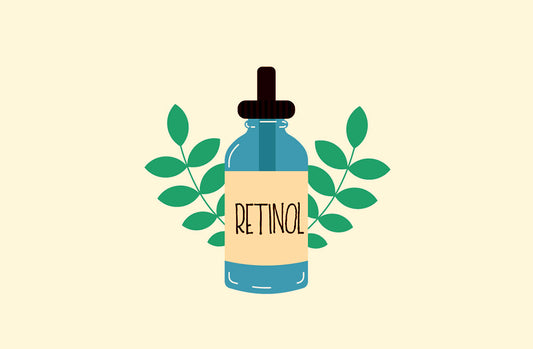In the world of anti-aging products, niacinamide and retinol have become major players. Both are known to boost collagen production to soften wrinkles and fine lines, and both can improve the appearance of hyperpigmentation due to anti-inflammatory activity.
Despite their similarities, there are some key differences between niacinamide and retinol to consider. Find out what these are, how to decide which one is right for you, and how you can integrate both into your skincare regimen.
What Is Retinol?
Retinol is the naturally occurring version of vitamin A, a fat-soluble vitamin commonly found in food sources like carrots, sweet potatoes, and eggs. When used topically, it helps to stimulate collagen production, unclogs pores, speeds up skin cell turnover, and controls sebum production, leading to plumper, clearer skin.1
Foundation Skincare’s Night Renewal Cream contains Granactive Retinoid (AKA hydroxypinacolone retinoate), which harnesses the power of prescription retinol with a lower risk of irritation and dryness. Retinoids are a derivative of vitamin A and work faster than retinol because they do not need to be converted in the skin like retinol.2 In addition to retinoids, the Night Renewal Cream also contains peptide growth factors to increase collagen and elastin and plant-based botanicals to further hydrate skin.
What Does It Target?
Retinol targets the following conditions:
How Often Can You Use Retinol?
Retinol is available over the counter, but you can also find prescription creams and gels with a higher concentration of the active ingredient. For those with sensitive skin, prescription retinol can be irritating to the skin, so it’s best to start off slowly and use it every few days.3
What Is Niacinamide?
Niacinamide is a B vitamin, which like retinol, is a multi-tasking ingredient. It helps fade dark spots and brighten skin by reducing melanin deposits while enhancing DNA repair to improve photodamaged skin.4 It also has anti-inflammatory properties and boosts keratin production to improve skin texture and fight premature aging. Another important quality of niacinamide is its ability to increase the natural production of ceramides, which are healthy fats in the skin that improve the skin barrier and lock moisture in.
Foundation Skincare’s Niacinamide Lotion contains a potent 10% concentration of the active ingredient. It is also formulated with a hyaluronic acid base to provide extra moisture to the skin while minimizing blemishes, pigmentation, and redness and controlling sebum production.
Niacinamide Lotion 10%
• Helps reduce acne, minimizes flare ups
• Improves inflammation & redness
What Does It Target?
Niacinamide targets the following conditions:
- Premature aging
- Hyperpigmentation
- Orange-peel skin
- Acne
- Inflamed skin
- Uneven skin tone
How Often Can You Use Niacinamide?
Now that you know what niacinamide is good for, how often should you use it? Because it’s gentle on the skin, niacinamide can be used twice a day. If you use Foundation Skincare’s Niacinamide Lotion 10%, you only need a thin layer, which should be applied after cleansing and any serum, but before moisturizing or sunscreen. Despite its high concentration of niacinamide, its hydrating base ensures the product is even suitable for sensitive skin.
Differences Between Niacinamide vs Retinol
While niacinamide and retinol may solve some of the same skin problems, there are some key differences between the two ingredients. These include the following:
- Retinol is a naturally occurring version of vitamin A, while niacinamide is a form of vitamin B3
- Niacinamide tends to be gentler on the skin, while many high concentrations of retinol can dry out or irritate skin
- Niacinamide does not increase sun sensitivity, but retinol does
Benefits Of Niacinamide vs Retinol
Both niacinamide and retinol are excellent ingredients, whether you are struggling with acne, premature aging, or hyperpigmentation. You may prefer niacinamide over retinol if you have sensitive skin and have experienced irritation or dryness with retinol products. This is especially true if you have a skin condition like eczema. You might also prefer niacinamide if you burn easily, as retinol makes your skin more sensitive to the sun. Another benefit to using niacinamide is that it significantly penetrates skin and enhances barrier function, while retinol is known to penetrate the epidermis.5
Can You Use Niacinamide With Retinol?
Why choose between niacinamide and retinol when your skincare regimen can benefit from both? We recommend using Foundation Skincare’s Night Renewal Cream to experience the benefits of retinol with a lower risk of irritation. Use it only at night after you have already applied Foundation Skincare’s Niacinamide Lotion 10%, which will help calm skin and contribute to DNA repair. This was proven in a study that combined niacinamide with retinoic acid, which is what retinol converts to once it’s in your skin. The study found that niacinamide lessens the irritation and dryness caused by retinol, encapsulating its synergistic relationship.6
Key Takeaways
Building the perfect skincare routine doesn’t have to be difficult. With niacinamide and retinol, you can be sure you’re covering all your bases when it comes to evening out your skin tone, clearing up acne breakouts, and reducing signs of premature aging. Find other options to integrate into your regimen in the full Foundation Skincare collection.
References:
-
https://www.ncbi.nlm.nih.gov/pmc/articles/PMC6791161/
-
https://my.clevelandclinic.org/health/treatments/23293-retinol
-
https://www.healthline.com/health/beauty-skin-care/retinoid-benefits
-
https://pubmed.ncbi.nlm.nih.gov/12100180/
-
https://www.ncbi.nlm.nih.gov/pmc/articles/PMC2921764/
-
https://www.spandidos-publications.com/ijmm/22/2/229





